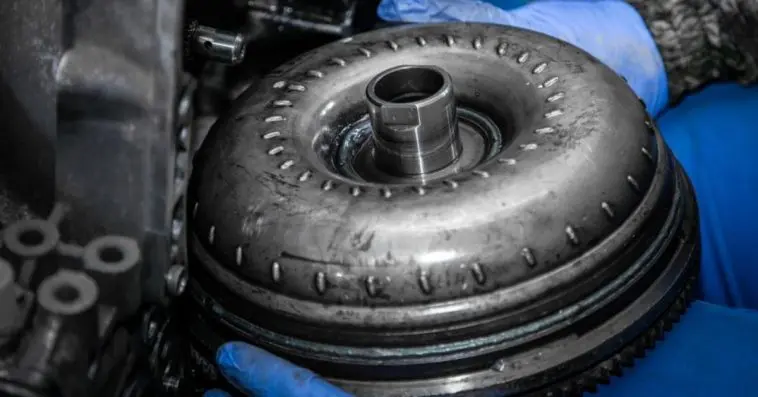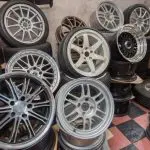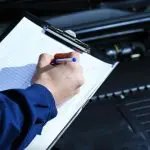In automatic transmission vehicles, there is an important part that ensures the performance of the transmission of the vehicle is excellent.
This is the part of the vehicle that converts the power generated from the engine to the transmission.
This means that whenever you change gears while driving your vehicle, you are passing commands to the torque converter of the vehicle.
Any complication that is experienced by the torque converter of your vehicle affects the functioning of the vehicle.
You might start noticing a few performance issues when the torque converter starts to fail.
Some of the most commons symptoms of a bad torque converter include:
- Slipping Of The Transmission
- Shuddering Feeling Felt When Driving
- Overheating Of The Vehicle’s Transmission System
- Contamination Of The Vehicle’s Transmission Fluid
- Damage Of The Torque Seal
Torque converter malfunctions come in a variety of types, either of which has their respective impacts.
They come in a variety of sizes, shapes and forms and you want to ensure that the complication with your vehicle’s torque converter is not escalated-as repairing this is a headache.
TABLE OF CONTENTS
What Is A Torque Converter?
A torque converter is a sort of gadget or device that links the engine of the vehicle and the transmission system.
It is responsible for the transmission of the power from the engine to the transmission and works just as the clutch does in manual transmission systems.
The torque converter also accomplishes the task of keeping the power output of the engine at optimum range.
What Causes A Bad Torque Converter?
The torque converter in its working is exposed to several factors that might affect its overall performance.
You will need to know what is causing the failure of the torque converter so that after repairing it you can avoid similar instances in the future.
Some of the causes of torque converter issues include:
- Damage of the seals on the torque converter: The leaks that are on the torque converter work to ensure that the transmission fluid is intact.
If the seals get damaged, the transmission fluid begins to leak, and this will affect the torque converter.
The torque converter won’t be able to transfer power to the transmission as it did before. This will then lead to the torque converter showing the symptoms. - The clutch solenoid of the torque converter getting damaged: The clutch solenoid of the torque converter is electronic that regulates the fluid that gets to the lockup clutch.
When it gets damaged, it will be unable to control the amount of fluid received, and this will affect the torque converter. - Issues with the needle bearings: Needle bearings are used to distinguish the stator, turbine, impeller and the converter casing.
When the bearings are damaged, the vehicle will produce noises when you are driving. There can also be metal chips that will arise from this and get to the torque converter. - Torque converter clutches that are degraded: The torque converter clutch work to lock the transmission and the engine into direct drive.
When it is degraded, it will have its share of effects on the performance of the torque converter.
5 Symptoms Of A Failing Torque Converter
Basically, when the torque converter of the vehicle malfunctions, the vehicle needs to put a lot of energy to sustain movement at a constant speed.
This is because the engine will require fairly more revolutions per minute, and this will cause a decrease in fluid pressure as well as decreased fuel efficiency.
Some other symptoms that will indicate a faulty torque converter include:
1. Slipping Of The Transmission
One main symptom of a faulty torque converter is the slipping of the transmission system.
This will because of the lack of regulation of fluid that reaches the transmission of the vehicle- a lot or insufficient amounts will get to the transmission.
This will cause the gears to be slippery and hence affecting the acceleration of the vehicle. This will lead to increase consumption of fuel which is costly in the long run.
However, this might be a sign that will indicate issues with the transmission fluid, so you need to be sure before you take action.
2. Shuddering Feeling Felt When Driving
When you are driving the vehicle at a relatively low speed, and you start to feel it shudder, then you are dealing with a faulty torque converter.
The feeling here is like driving on a bumpy, rough road and may suddenly disappear.
The shuddering feeling is responsible for the lagging of the vehicle, and you should be able to notice it.
The vehicle might appear to be vibrating or shaking when you drive it at around 30mph.
3. Overheating Of The Vehicle’s Transmission System
There are models of vehicles that can indicate when the transmission system is overheating.
This might be followed by the inability of the transmission to switch from one gear to another. This will be a sign that the torque converter is not performing its role effectively.
Ultimately, the torque converter won’t be able to transfer power from the engine to the transmission of the vehicle.
4. Contamination Of The Vehicle’s Transmission Fluid
The transmission fluid comes into contact with many parts of the transmission system and even the torque converter.
When it gets contaminated, it will damage the parts and affect their performance.
Contaminated transmission fluid is ineffective in its role as a lubricant and will eventually affect the components of the transmission of the vehicle.
Therefore, the torque converter may get damaged when you are not keen to replace contaminated transmission fluid.
5. Damage Of The Torque Seal
There are seals on the torque converter, which are at risk of being damaged by several factors.
If this happens, the transmission fluid leaks the torque converter will not be able to get its work done.
This might affect both the torque converter and the transmission system of the vehicle.
Other signs that will show that the torque converter is damaged is issues with the speed of the vehicle.
This will be caused by the power output of the torque converter not being consistent and unable to work as needed.
The shifting from one gear to the other will also not be as smooth as it normally is when the torque converter is in perfect working condition.
How To Test A Torque Converter
Before you conclude, you should know that you will need to be sure about what is affecting the abnormal behavior of the vehicle.
It could either be the transmission system or the torque converter of the vehicle.
One way that is used for older transmissions to check the torque converter of the vehicle is through carrying out a stall-speed test.
This can be completed through the following steps:
Step 1. Contact The Car Manufacturer And Perform Other Necessary Precautions
You will need to confirm with the manufacturer of the vehicle that carrying out the test is safe.
This is because there are some models of vehicles that have delicate transmissions-some other vehicles such as the anti-lock brake system or the traction control don’t support this procedure.
Step 2. Prepare The Vehicle For The Test
Preparation of the vehicle ensues making sure that the fluids are at the recommended levels.
The wheels of the vehicle need to be chocked and setting the parking brake and installing a tachometer if the car doesn’t already have one.
Step 3. Start The Vehicle’s Engine
Step on the brake pedal of the vehicle all the way and turn it on-the transmission needs to be set in drive. Have the brake at that position and don’t release it.
Step 4. Press On The Accelerator
While still stepping of the brake pedal, step on the accelerator for not more than three seconds.
You need to take caution not to step on it for more than five seconds as it may blow out. The RPM the engine maxes out is what is referred to as the stall speed.
Step 5. Interpretation Of The Results
If you get an RPM reading that is lower than the engine and the torque converters specifications, then the torque converter will need to be checked.
A professional will consult whether the torque converter will have to be replaced or repaired.
Diagnosing For Bad Torque Converters
You can test whether you are dealing with a bad torque converter using the following procedure:
- Start the engine of the vehicle-let the engine warm-up and step on the accelerator to let the engine rev up. When the engine resets to its idle state, press the brake and shift it to drive gear.
- Note the sounds produced. If you can hear lurching, clicking or whirring sounds, then the converter is faulty.
- If you take the vehicle for a drive and you have trouble working the gears and that the vehicle lurches, then the torque converter will be damaged.
How Much Does It Cost To Replace A Torque Converter?
Replacing the torque converter is basically less costly than replacing the transmission system of the vehicle.
You can get a new torque converter in the range of $150 and $350 for the part itself.
The labour for the repairing of the torque converter will cost you around $600 on the lower side and $1000 on the upper side.
The whole process will not take more than ten hours to be completed.
Frequently Asked Questions
Now above the information solved your issue of what happens when a torque converter goes bad.
But I also recommend you keep reading below the additional tips that people often ask the questions according to the main topic.
Q1: Can I Drive With A Bad Torque Converter?
Yes, you can still drive the vehicle, but this will cause more damage to the vehicle.
A bad torque converter continues to affect the vehicle and not only the transmission system of the vehicle.
One effect of driving a vehicle with a damaged torque converter is debris may get to other sensitive parts of the vehicle.
This may damage them and ultimately cause them to break down as well.
Q2: Will A Bad Torque Converter Cause No Forward Gears?
Yes, the torque converter may negatively affect the forward gears of the vehicle.
Working the forward gears might be a nightmare since they may not work altogether, and they may even slip.
Q3: Can A Bad Torque Converter Cause No Movement?
Yes, a bad torque converter can cause no movement in the gear of the vehicle.
In many cases, a faulty transmission will be what might cause no movement in gear, but you will have to check just to be sure.
Q4: Can A Bad Torque Converter Cause Stalling?
Yes, a bad torque converter can cause stalling of the vehicle’s engine.
Q5: Will A Bad Torque Converter Damage A Transmission?
Yes, the damage on the torque converter can affect the performance of the transmission.
This is because the bad torque converter will lead to overheating and damage as a result of friction on the vehicle’s transmission.
The damage on the transmission will increase when the torque converter is not repaired or replaced soon.
Q6: What Does A Bad Torque Converter Sound Like?
Some noises will be produced when the torque converter is faulty. A whining noise may be the first sound you will hear.
You may also hear a rattling noise produced when a mechanism with clutches is damaged. A loud noise might be produced when the vehicle is in the park.
Q7: What Is A Torque Converter Shudder?
A torque converter shudder is experienced when the clutch in the converter of an automatic transmission vehicle fails to transfer the required transition from slipping to locked up.
This fails to occur in a smooth process since the clutch will lock up and then slip or breakaway.
What occurs is that it can’t hold sufficient torque needed to complete the lock-up.
Conclusion
Checking the vehicle’s torque converter is an excellent idea when you are not sure what is affecting the transmission system.
At times, car owners end up paying large sums of money to repair or even replacing their vehicle’s transmission system-while the torque converter is what is malfunctioning.
You should always look out for the above symptoms of a bad torque converter to be sure what you are dealing with.
Sources:
1. Gearstar – https://gearstar.com/torque-converter-problems-symptoms-replacement-costs/
2. AAMCO Blog – https://www.aamcoblog.com/Article/Signs-of-a-Failing-Torque-Converter-and-How-to-Fix-it
3. All in One & Lube Lab – https://allinoneautoservice.com/car-wash-oil-change/02/10/__trashed-2/




